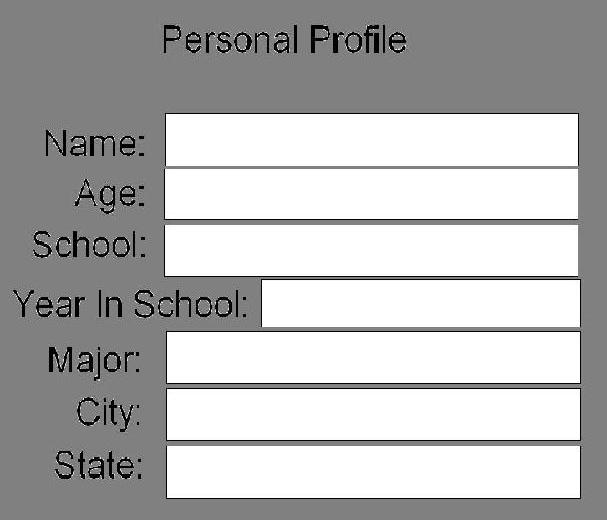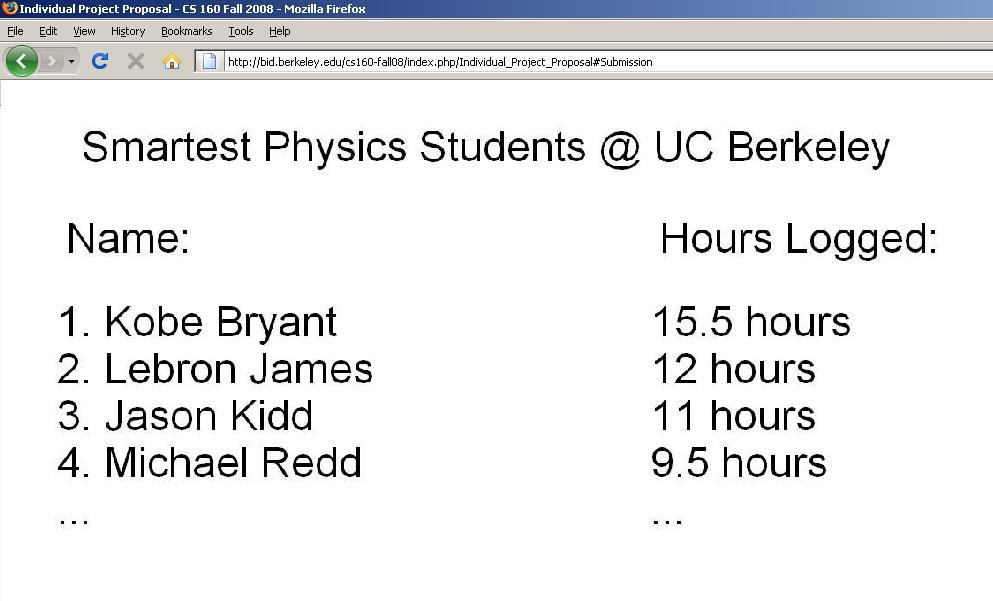ProjectProposal-PaulIm
From CS 160 Fall 2008
Contents |
Target User Group
The target group would consist of students, most likely high school and college students. Specifically, these are students who care about their futures and who are motivated enough to purchase a game in order to fix their time-wasting habits (most likely students with a middle-upper class financial background). This game would not appeal to students who are complacent about their time spending habits, or those who flat out do not care about wasting time. In the future, if this game is successful, perhaps this target group could be generalized to the entire working, middle-aged population. Every person who plays this game will want to succeed and be more effective in their current position/role.
Problem Description
Students are getting more and more distracted as new technologies constantly bombard every area of their lives. Some of these students even end up getting kicked out of school because of their obsessions with media and their lack of self-control. Less extreme cases of procrastination include students who end up pulling three or four all-nighters in a row before a project due-date or before a final, thus affecting their health as well as their information retention. The point of this game would be to redirect the interests of these students towards completing their academic responsibilities first, before they have their media time.
Problem Context and Forces
A simple game that helps with time usage obviously will not be as entertaining as a movie or a fully developed video game. However, if this serious game captures even a minute amount of interest from the student, hopefully it will temporarily satisfy their enormous desire for media consumption so they can postpone it till later. So, the game has to be interesting enough. However, if the game is too interesting, this game will then be the cause of the exact same problem it is trying to fix. Students may end up wasting too much time playing this serious game. In this perspective, there needs to be a fine balance in the entertainment level of the game. Procrastination is a problem that students believe they can fix on their own. No matter how many times they fail, they constantly end up relying on their own willpower; these students would think that a self-help game would be a waste of time. Thus, this game needs to be cheap and convenient enough so that students won’t think that it’s bothersome to invest their money and time in. If the game ends up taking extended amounts of time to play, people would see absolutely no point in playing it. The game needs to be accessible at all times; a student can end up studying early in the morning or late into the night. The game will be played by technologically savvy students. This target audience makes it very easy to create almost any kind of software. The game must also appeal to the typical teenage student (both male and female). Like with any other game, there will be times when the student simply won’t want to play. This game would need to be automatic and easily accessible at all times (perhaps 24/7) in order to be fully effective for a student.
Solution Sketch
My solution would be to have a computer program that monitors a student’s computer activity and logs the amount of time he actually spends on academic material. This program is also linked over a network to any televisions or game consoles that the student may own. If any entertainment-related material is open on the computer, or if the television/console is turned on, no study time will be logged. The program will log the total amount of time a student spends studying on his computer during a period of time. Also, any non-computer work can be logged just by leaving the computer idle (unfortunately, a student can go out and leave his computer on, at which point in time the program would stop logging hours after a set period of time). An online list of “Smartest Students” will be generated based on these times. Based on initial inputs by the student, this list can be customized in many ways (e.g. smartest student at UC Berkeley, smartest sophomore at UC Berkeley, smartest physics major, etc…) This solution provides a convenient competition amongst students who want some recognition for their hard work. Instead of a conventional game that you actively play, this program, with all of its rules (must be doing something academic), objectives (to be #1), and boundaries (cannot log hours after going out), can be simply seen as a way to make the studying process a lively competition. Perhaps some prizes can be given out for the students who log the most hours (funding could be provided from advertising).
References
After doing a general web search, there were no online self-help tools/games for helping students with their time spending habits. Many of the links pointed to books or educational literature regarding the topic.
- http://www.mentalhelp.net/poc/view_doc.php?type=doc&id=9770&cn=353
- http://lizditz.typepad.com/i_speak_of_dreams/2004/11/online_self_hel.html
I received the idea of a program that constantly monitors your computer activity from a program call Covenant Eyes.



